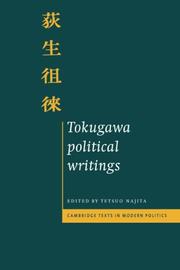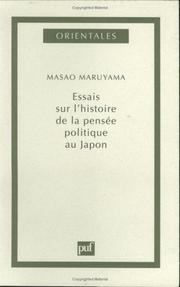| Listing 1 - 10 of 10 |
Sort by
|
Book
Year: 1973 Publisher: Tōkyō : Iwanami Shoten,
Abstract | Keywords | Export | Availability | Bookmark
 Loading...
Loading...Choose an application
- Reference Manager
- EndNote
- RefWorks (Direct export to RefWorks)
Book
ISBN: 9780521567176 9780521561860 9780511521539 Year: 1998 Publisher: Cambridge Cambridge University Press
Abstract | Keywords | Export | Availability | Bookmark
 Loading...
Loading...Choose an application
- Reference Manager
- EndNote
- RefWorks (Direct export to RefWorks)
Dissertation
Year: 1999
Abstract | Keywords | Export | Availability | Bookmark
 Loading...
Loading...Choose an application
- Reference Manager
- EndNote
- RefWorks (Direct export to RefWorks)
Book
Year: 1972 Publisher: Tōkyō : Iwanami Shoten,
Abstract | Keywords | Export | Availability | Bookmark
 Loading...
Loading...Choose an application
- Reference Manager
- EndNote
- RefWorks (Direct export to RefWorks)
Confucianism --- Confucianism. --- Ogyū, Sorai, --- Japan.
Book
ISBN: 4924530026 Year: 1983 Publisher: Tokyo Toho Gakkai
Abstract | Keywords | Export | Availability | Bookmark
 Loading...
Loading...Choose an application
- Reference Manager
- EndNote
- RefWorks (Direct export to RefWorks)
Philosophy, Japanese --- Itō, Jinsai, --- Motoori, Norinaga --- Ogyū, Sorai, --- Itō, Jinsai --- Ogyū, Sorai

ISBN: 0521567173 0521561868 0511521537 Year: 1998 Publisher: New-York Cambridge University press
Abstract | Keywords | Export | Availability | Bookmark
 Loading...
Loading...Choose an application
- Reference Manager
- EndNote
- RefWorks (Direct export to RefWorks)
The modern political consciousness of Japan cannot be understood without reference to the history of the Tokugawa period, the era between 1600 and 1868 that preceded Japan's modern transformation. Tetsuo Najita introduces the ideas of the leading political thinker of the period, Ogyu Sorai (1666-1728), a pivotal figure in laying the conceptual foundations of Japan's modernization. His basic thoughts about history and the ethical purposes of politics are presented, revealing the richness of the philosophical legacy of eighteenth-century Japan, a legacy which cannot be seen through the perspective of 'westernization'. His ideas reveal a vision of human diversity and individual virtue which can be viewed in comparative perspective, as well as an insight into the history and politics of Japan. The texts are accompanied by a chronology of Sorai's life, a glossary, a guide to persons mentioned in the text, and a guide to further reading, as well as Professor Najita's introduction, which puts Sorai's work into philosophical and historical context.
Social Sciences --- Political Science --- Ogyū, Sorai, --- Sorai, Ogyū --- Butsu, Mokei, --- Disheng, Culai, --- Monobe, Mokei, --- Ogyū, Mokei, --- Ogyū, Nabematsu, --- Akagi-ō, --- Ken'en, --- Yōan, --- 荻生徂徠, --- 荻生徂徕, --- 荻生徂來, --- 荻生徂来,

ISBN: 2130473466 9782130473466 Year: 1996 Volume: *3 Publisher: Paris: PUF,
Abstract | Keywords | Export | Availability | Bookmark
 Loading...
Loading...Choose an application
- Reference Manager
- EndNote
- RefWorks (Direct export to RefWorks)
Caractéristiques nationales japonaises --- Japanese national characteristics --- Japans volkskarakter --- National characteristics [Japanese ] --- Volkskarakter [Japans ] --- Political science --- Science politique --- History --- Histoire --- Neo-confucianisme --- Philosophie japonaise --- Idees politiques --- Ogyu, Sorai, --- Nationalism --- Japan --- Neo-confucianisme - Japon. --- Philosophie japonaise - Histoire --- Idees politiques - Japon - Histoire --- Political science - Japan - History --- Ogyu, Sorai, - 1666-1728

ISBN: 0824829786 9780824829780 082483030X 9780824830304 1435665880 0824864689 Year: 2006 Publisher: Honolulu University of Hawaii press
Abstract | Keywords | Export | Availability | Bookmark
 Loading...
Loading...Choose an application
- Reference Manager
- EndNote
- RefWorks (Direct export to RefWorks)
Tsunayoshi (1646-1709), the fifth Tokugawa shogun, is one of the most notorious figures in Japanese history. Viewed by many as a tyrant, his policies were deemed eccentric, extreme, and unorthodox. His Laws of Compassion, which made the maltreatment of dogs an offense punishable by death, earned him the nickname Dog Shogun, by which he is still popularly known today. However, Tsunayoshi's rule coincides with the famed Genroku era, a period of unprecedented cultural growth and prosperity that Japan would not experience again until the mid-twentieth century. It was under Tsunayoshi that for the first time in Japanese history considerable numbers of ordinary townspeople were in a financial position to acquire an education and enjoy many of the amusements previously reserved for the ruling elite. Based on a masterful re-examination of primary sources, this exciting new work by a senior scholar of the Tokugawa period maintains that Tsunayoshi's notoriety stems largely from the work of samurai historians and officials who saw their privileges challenged by a ruler sympathetic to commoners. Beatrice Bodart-Bailey's insightful analysis of Tsunayoshi's background sheds new light on his personality and the policies associated with his shogunate. The Dog Shogun is a thoroughly revisionist work of Japanese political history that touches on many social, intellectual, and economic developments as well. As such it promises to become a standard text on late-seventeenth and early-eighteenth-century Japan.
J3361 --- J2284.60 --- S35/0580 --- Japan: History -- Kinsei, Edo period -- establishment of the shogunate, 17th century general --- Japan: Genealogy and biography -- biographies -- Kinsei, Edo, Tokugawa period, early modern (1600-1867) --- Japan--Biographies --- Shoguns --- Tokugawa, Tsunayoshi, --- Japan --- Politics and government --- 徳川家光, --- 徳川綱吉, --- 德川綱吉, --- Tokugawa, Tsunayoshi --- Hotta, Masatoshi --- Ogyū, Sorai
Book
ISBN: 3030154750 3030154742 Year: 2019 Publisher: Cham : Springer International Publishing : Imprint: Springer,
Abstract | Keywords | Export | Availability | Bookmark
 Loading...
Loading...Choose an application
- Reference Manager
- EndNote
- RefWorks (Direct export to RefWorks)
This book contains short analyses (kaidai) of Ogyu Sorai’s (1666-1728) most important works, as well as a biography and a number of essays. The essays explore various aspects of his teachings, of the origins of his thought, and of the reception of his ideas in Japan, China, and Korea before and after "modernization" struck in the second half of the nineteenth century. Ogyu Sorai has come to be considered the pivotal thinker in the intellectual history of Early Modern Japan. More research has been done on Sorai than on any other Confucian thinker of this period. This book disentangles the modern reception from the way in which Sorai's ideas were understood and evaluated in Japan and China in the century following his death. The joint conclusion of the research of a number of the foremost specialists in Japan, Taiwan, and the West is that Sorai was and remains an original, innovative, and important thinker, but that his position within East-Asian thought should be redefined in terms of the East-Asian tradition to which he belonged, and not in the paradigms of European History of Philosophy or Intellectual History. The book represents up-to-date scholarship and allows both the young scholar to acquaint himself with Sorai, and the intellectual historian to compare Sorai with other thinkers of other times and of other philosophical traditions.
Ogyū, Sorai, --- Butsu, Mokei, --- Disheng, Culai, --- Monobe, Mokei, --- Ogyū, Mokei, --- Ogyū, Nabematsu, --- Akagi-ō, --- Ken'en, --- Yōan, --- 荻生徂徠, --- 荻生徂徕, --- 荻生徂來, --- 荻生徂来, --- Philosophy, Asian. --- Religion—History. --- Political philosophy. --- Non-Western Philosophy. --- History of Religion. --- Political Philosophy. --- Political philosophy --- Asian philosophy --- Oriental philosophy --- Philosophy, Oriental --- Philosophy, Modern. --- Religion --- Political science --- Philosophical Traditions. --- Religious history --- Modern philosophy --- History. --- Philosophy.
Book
ISBN: 2600002855 9782600002851 Year: 1998 Volume: 181 Publisher: Genève Droz
Abstract | Keywords | Export | Availability | Bookmark
 Loading...
Loading...Choose an application
- Reference Manager
- EndNote
- RefWorks (Direct export to RefWorks)
Confucianism --- Confucianisme --- Sorai, Ogyû --- Political culture --- Japan --- Rites and ceremonies --- Politics and government --- 1600-1868 --- Philosophy --- Political science --- Philosophy, Confucian --- J4610 --- J4600.60 --- J1440 --- J1560 --- Administration --- Civil government --- Commonwealth, The --- Government --- Political theory --- Political thought --- Politics --- Science, Political --- Social sciences --- State, The --- Mental philosophy --- Humanities --- Political aspects --- History --- Japan: Politics and law -- theory, methodology and philosophy --- Japan: Politics and law -- history -- Kinsei, Edo, Tokugawa period, early modern (1600-1867) --- Japan: Philosophy -- Confucianism --- Japan: Philosophy -- individual philosophers -- Kinsei, Edo, Tokugawa period, early modern (1600-1867) --- Ogyū, Sorai --- Sorai, Ogyū --- Butsu, Mokei, --- Disheng, Culai, --- Monobe, Mokei, --- Ogyū, Mokei, --- Ogyū, Nabematsu, --- Akagi-ō, --- Ken'en, --- Yōan, --- 荻生徂徠, --- 荻生徂徕, --- 荻生徂來, --- 荻生徂来, --- Political and social views.
| Listing 1 - 10 of 10 |
Sort by
|

 Search
Search Feedback
Feedback About UniCat
About UniCat  Help
Help News
News